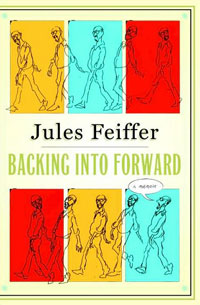Another National Treasure

Another phrase I am hearing bandied about with some frequency is “national treasure”—I was just listening to Alison Krauss introduce the Fairfield Four as such, and recently Viking Press’s Paul Slovak referred to Rebecca Solnit as a national treasure. So before the phrase becomes a cliché, let me nominate Jules Feiffer. Just based on his wonderful career as an illustrator he would be deserving of serious attention—add his work in film, theater, and fiction, and his place in an American pantheon is secure.
Now comes his memoir Backing into Forward (Doubleday), which unpacks a 50-year-plus life’s work from his youth plagued by learning disabilities and a domineering mother to his apprenticeship with legendary cartoonist Will Eisner to a stint in the Army and his work at the Village Voice back when the Voice was meaningful as the only alternative weekly in the U.S.A.
Feiffer has gone on to win a Pulitzer Prize, a George Polk Award, an Obie, and numerous lifetime achievement awards, and has taught at Yale, Northwestern, Dartmouth, and for the past decade at Stony Brook Southampton College. It is, of course, a life of substantial achievement, making his claim that his story “relates how persistent failure inspired him to reinvent himself as an artist over and over” particularly resonant.
Feiffer illuminates his process of writing Backing into Forward:
Like I said, a national treasure.
